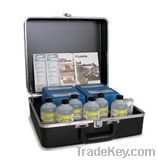

Prix FOB
Obtenir le dernier prix580 ~ 700 USD / Unit
|1 Unit Minimum Order
Pays:
India
N ° de modèle:
Chemical
Prix FOB:
580 ~ 700 USD / Unit Obtenir le dernier prix
Localité:
New Delhi
Prix de commande minimale:
580 per Unit
Commande minimale:
1 Unit
Packaging Detail:
as per customer requirement
Heure de livraison:
4 to 5 week
Capacité de Fournir:
50 Unit per Week
Payment Type:
T/T, L/C
Groupe de produits :
Personne à contacter Sonia
Jaipur, Rajasthan
Soil Testing Kit is a Compact, Mobile, User Friendly and Fastest way to analyze your soil yourself. Soil Chemical Analysis Kit is developed for extension purpose. The results can be used advantageously for soil fertility evaluation and fertilizer recommendation.The whole idea of Soil Testing is based on the efficient use of fertilizer and adopting better farming practices. Since the efficient use of fertilizers is directly related to the knowledge about what nutrients, the soil lacks.
The Soil Testing Kit analyzes the following parameters.
Significance of Analysis of Soil Components
NITROGEN - Nitrogen forms new cells and is
essential to total plant development. A shortage of
nitrogen halts plant growth and cell production. Symptoms
of nitrogen deficiency are a yellowish brown color along the
veins and tips of leaves, stunted growth of the plant or paleness
in color on older leaves. Too much nitrogen can cause tall,
spindly plants that easily topple over and nitrate poisoning
(look for a strong red tint to the leaves). Nitrogen is
also essential to the compost pile, as it aids in the breaking
down of old plant residues. Good sources of nitrogen include:
blood meal, cottonseed meal, fish meal, soybean meal, rabbit
manure and tea grinds. You can also grow a cover crop of
legumes in the fall to raise the nitrogen level for the next
springs crop
PHOSPHORUS - Phosphorus produces vigorous seed and root development. A shortage of phosphorus slows cell division and results in stunting of growth and late maturity of the plant. A symptom of phosphorus deficiency is spindly plants with purple streaks in the stems. Since phosphorus moves very slowly in the soil, it is essential to have it available during early plant development. Good sources for phosphorus include: bone meal, rock phosphate and colloidal phosphate. Incorporating organic matter (compost) into the soil makes the phosphorus present more readily available to the plants.
POTASSIUM - Also called Potash, this nutrient helps produce strong and sturdy stems. It advances root growth and helps plants resist disease and cold weather. A shortage of this nutrient causes stunting and stem weakness. Symptoms include a yellowing of leaf edges and yellowing of the leaves veins. This nutrient must be available during early plant development. Good sources of potash are: cow manure, compost, granite meal, greensand and wood ashes.
For soils that are too acidic, add lime to the soil in the fall. Some sources of lime are: Dolomitic limestone. This will raise the pH of the soil while supplying calcium and magnesium. Apply in late fall for next years crops. Hydrated lime will provide quicker results because of the smaller particle size and is especially useful for raising the soil pH quickly. Be aware that hydrated lime may cause severe injury to young plants. Apply at least 3 weeks before planting your crops. Wood ashes (not charcoal ashes) can also be added to acidic soil to correct the pH level.
For soils that are too alkaline, add powdered agricultural sulfur, aluminum sulfate or iron sulfate to the soil for a quick fix. For a long term solution, continually add acidic organic matter to the soil, such as peat moss, pine needles and oak tree leaves until the pH level is correct.
COMPOST - The single most important addition to any garden is compost. Compost enriches the soil in the garden, promotes the development of beneficial insect populations, helps retain moisture and aids in stabilizing the pH level. Every gardener should have a compost pile or bin near their garden. Just about any plant material can be recycled into valuable compost, along with coffee grounds, eggshells (crushed), cow manure and horse manure. If you add lawn clipping to the compost pile, make sure they have not been treated with any chemical herbicides. In the fall, make sure to shred any leaves before adding them to the pile. DO NOT add diseased plant material to the compost pile or weeds that have gone to seed.
Soil and Fertilizer pH Measuring Equipment
Features
Show to Use
| Pays: | India |
| N ° de modèle: | Chemical |
| Prix FOB: | 580 ~ 700 / Unit Obtenir le dernier prix |
| Localité: | New Delhi |
| Prix de commande minimale: | 580 per Unit |
| Commande minimale: | 1 Unit |
| Packaging Detail: | as per customer requirement |
| Heure de livraison: | 4 to 5 week |
| Capacité de Fournir: | 50 Unit per Week |
| Payment Type: | T/T, L/C |
| Groupe de produits : | Measuring Meters |